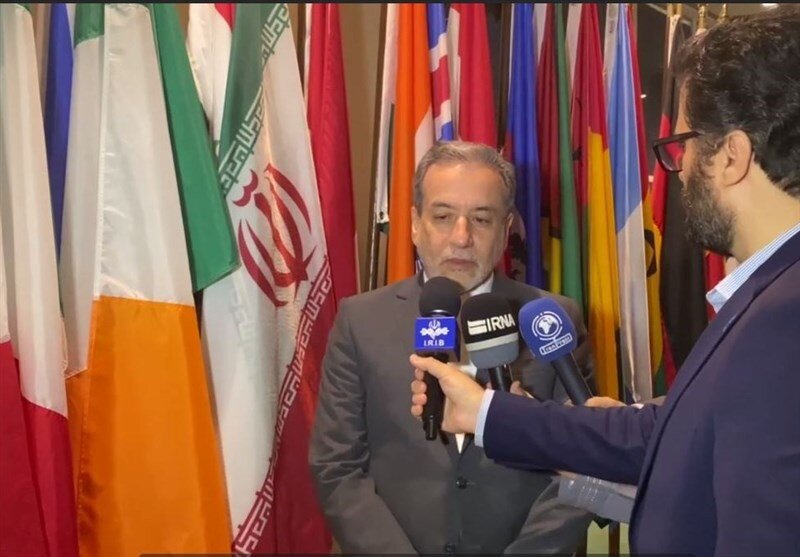Tehran ready to restart nuclear talks if other parties are prepared: FM

TEHRAN – Iran's Foreign Minister Abbas Araqchi has indicated that Tehran is ready to restart nuclear negotiations if the other signatories to the Joint Comprehensive Plan of Action (JCPOA) are also prepared.
Speaking during a trip to New York, Araqchi highlighted that Iran remains open to dialogue aimed at reviving the 2015 nuclear deal.
He, however, ruled out the possibility of meeting with U.S. Secretary of State Antony Blinken during his trip, stating that current circumstances do not support such a dialogue.
“At this time, I do not see the possibility of a meeting with the U.S. Secretary of State,” Araghchi said, adding, “In my opinion, it would not be advisable for such a conversation to take place right now.”
Araghchi reflected on past talks, noting that during previous negotiations on the Joint Comprehensive Plan of Action (JCPOA), there were opportunities for direct discussions between Iranian and U.S. officials. However, he stressed that the current situation is different, and conditions are not favorable for a similar exchange.
In an interview, Araqchi addressed broader regional concerns, particularly the ongoing conflict between Israel and Palestinian groups in Gaza.
He condemned Israel's actions in Gaza, where the regime has been engaged in a genocidal war for over 11 months. Araqchi argued that the Israeli government, despite its advanced military capabilities, has failed to defeat Hamas, the Palestinian resistance movement based in Gaza.
“The Israeli regime is stuck in a quagmire in Gaza,” Araqchi said, adding that Israel’s failure to destroy Hamas has led to an expansion of violence across the region, including escalations in the occupied West Bank and Lebanon.
Araqchi specifically referenced the recent Israeli detonation of thousands of booby-trapped devices in Lebanon, which resulted in the deaths of at least 39 people and injured over 3,000. He described these actions as acts of “blind terrorism” driven by frustration.
“The Zionists think that by broadening the conflict zone, they can escape the deadlock in Gaza,” Araqchi warned, while emphasizing that Iran remains vigilant against such strategies.
Araqchi also dismissed U.S. claims that it was unaware of Israel’s actions in Lebanon, asserting that Washington bears significant responsibility for these events through its support for Israel, both militarily and politically.
In his remarks, Araqchi revisited a statement he made in August, reaffirming Iran's willingness to manage tensions with the United States, despite acknowledging deep-seated differences. He noted that while full resolution of these differences may be impossible, the costs associated with them could be minimized through “honorable means.”
Araqchi calls for withdrawal of foreign military forces from Syria
Araqchi used his time in New York to meet with UN officials and other diplomats, calling for the withdrawal of foreign military forces from Syria.
In a meeting with UN Special Envoy for Syria Geir O. Pedersen, Araqchi voiced support for the UN’s efforts to resolve the Syrian conflict and stressed that reconstruction in Syria could only begin after foreign troops leave.
Araqchi also condemned the United States for its decision to label Cuba a state sponsor of terrorism, calling it an unjustified and politically motivated move. He expressed solidarity with Havana, criticizing U.S. sanctions on Cuba and reaffirming Iran’s commitment to expanding bilateral ties with the island nation.
‘Iran willing to strengthen ties with Saudi Arabia’
In another key development, Araqchi expressed Iran's desire to strengthen ties with Saudi Arabia, signaling Tehran's commitment to improving regional relations.
The Iranian and Saudi foreign ministers held a meeting on the sidelines of the 79th annual session of the United Nations General Assembly in New York on Sunday.
‘Tehran pushes for maximum cooperation with Persian Gulf states’
In another meeting with his Kuwaiti counterpart, Araqchi emphasized the need for collective action among Persian Gulf countries to counter Israeli aggression.
He reiterated Iran's stance that Israeli Prime Minister Benjamin Netanyahu is resorting to desperate measures in Gaza, as Israel continues to struggle with the Palestinian Resistance. Araqchi also highlighted the assassination of senior Hamas leader Ismail Haniyeh by Israeli forces and vowed that such actions would not go unanswered.
Araqchi concluded by stressing that Israeli aggression represents a grave threat to regional peace, calling on neighboring countries to unite against Israel’s destabilizing actions. Iran, he said, remains committed to fostering dialogue and strengthening relationships with Gulf nations to ensure stability in the region.
